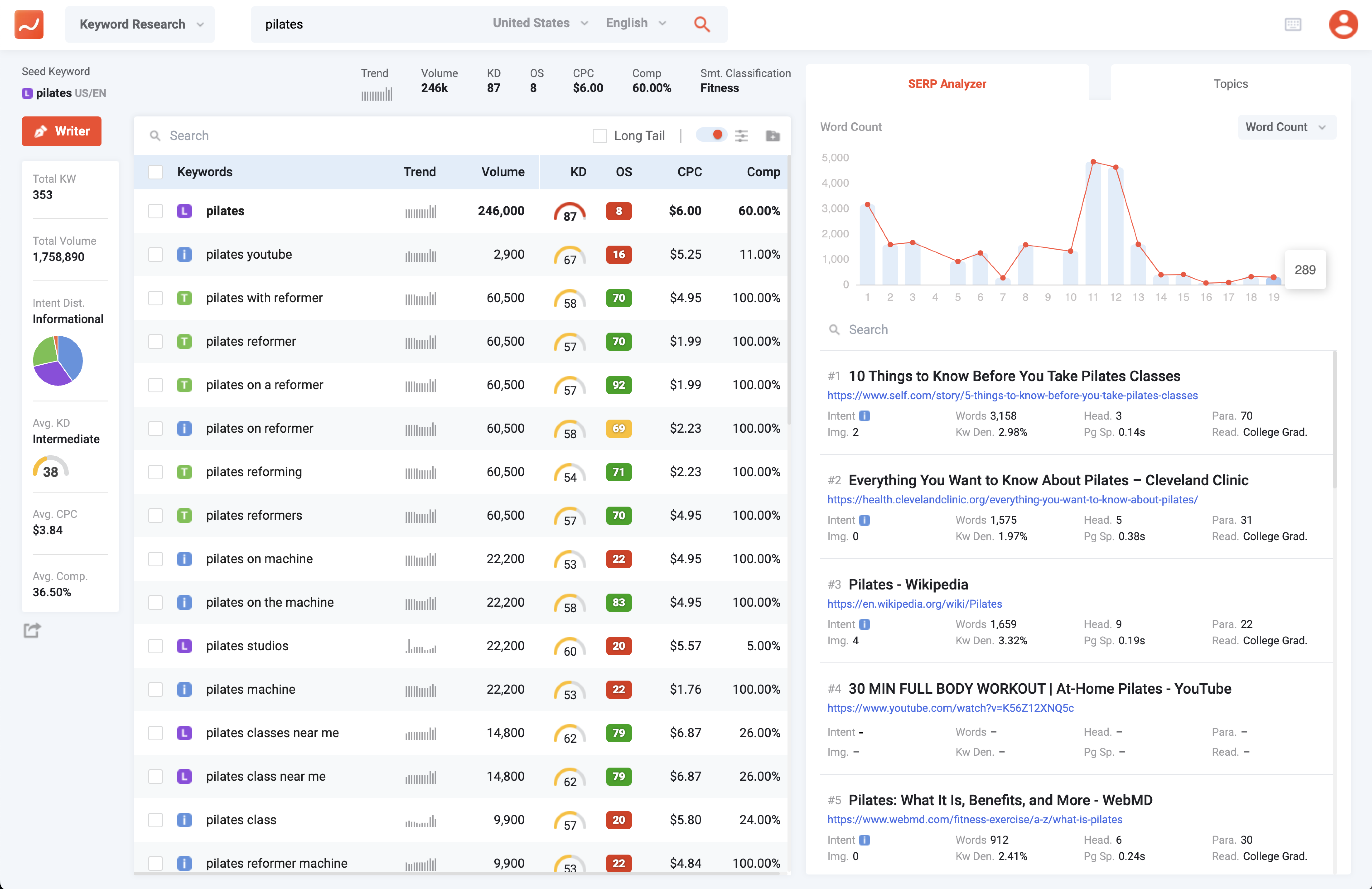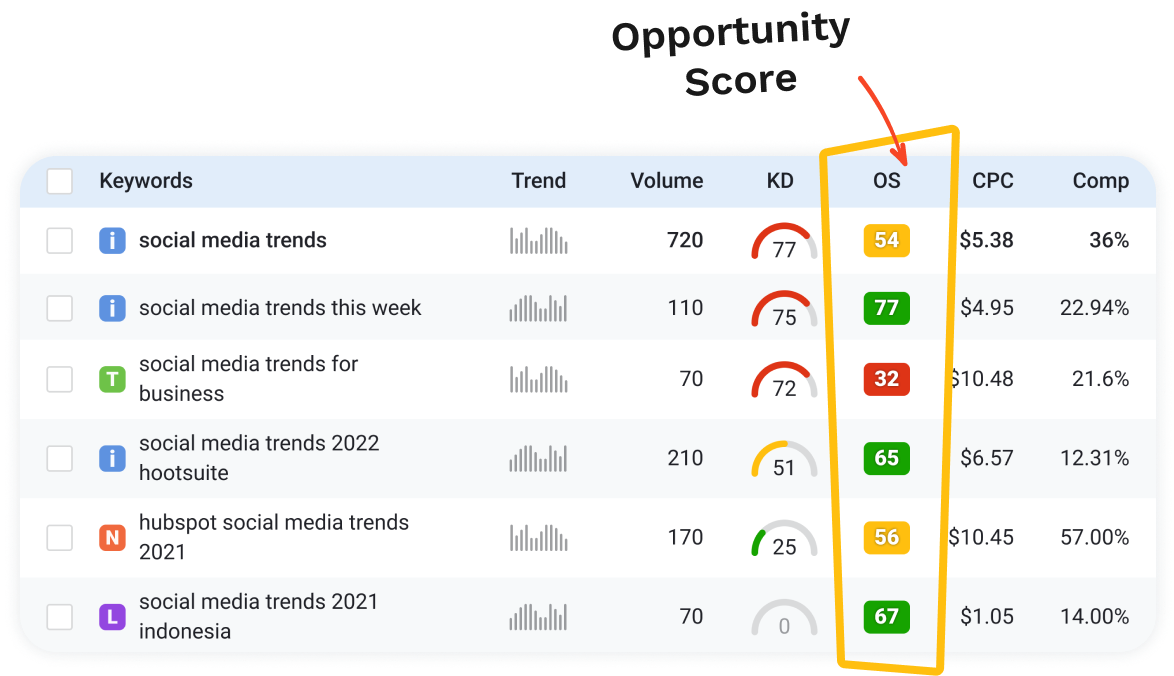You can research your keywords and optimize your SEO with a free keyword generator. But which one? Find out the best one for you through these top 8 listings.
- The importance of keywords in content marketing
- Know the top 8 best tools for finding relevant keywords.
Content marketing is essential for making your business appear more in front of your customers.
However, there are several obstacles that you will face, especially when it comes to SEO and finding your keywords.
For example, you want to rank for keyword A. Due to the nature of the semantic web, you need more related keywords in your content to send a stronger signal to Google that you are highly relevant to the topic.
If not, you can’t expect the users to somehow find your website or blog posts on the SERPs. This is especially true if you don’t know what they are looking for and make the right use of keywords.
Search engines have become more sophisticated and are now able to identify pages that make good use of keywords. As a result, the results obtained from keyword-generating tools have become even more critical.
An incredible keyword generator tool is a solution for getting the relevant keywords (and semantic keywords) to help you rank higher.
Typically, keyword generator tools allow you to check the search volumes of specific search queries. What more can these tools do? In this article, we have outlined the details of keywords generators and listed 8 best tools for you to choose.
Keyword research will always play a part in a thorough SEO strategy. And, of course, it is an ongoing process that never really ends.
If you want your website to get traffic from Google or other search engines, you need to make sure that your website is sending the right signals to them. This means that you should be utilizing words that your potential audience is looking for.
So what do you often use keywords for?

#1. Use keywords in your blog posts:
Keyword research is an essential SEO task. You can’t compete without content that rocks. It represents a vital part of finding the right keywords to use for your site.
Keywords are important because they are the linchpin between what people are searching for and the content you are providing to fill that need. Every business goal in ranking on search engines is to drive organic traffic to your site from the search engine result pages. In order to do that, the keywords you choose to target (meaning, among other things, the ones you choose to include in your content) will determine what kind of traffic you get.
Besides your overall content, there are several places for you to put your keywords:
- In the title, subtitles
- In the meta description
- In the pictures’ ALT
- In the URL
As a result of using the relevant keywords to attract your customers and let the search engine know your content, you can rank higher on the SERPs. When the majority selects the website on the first page, your site ranking will increase along with the organic traffic.
#2. Use keywords as inspiration:
Using related keywords in your blog posts will increase your SEO metrics and also show the search engine what you are writing.
If possible, use one of the related keywords and primary keywords in the post title, subheading, and the page’s meta description and SEO title.
Or, you can use related keywords as inspiration for other content. Keyword research provides rich data about what people (prospects) want to know about your industry, products, and services. If you know what information your prospects are looking for you can more easily develop content on your website to meet their needs.
When you create a list of phrases that relate to a primary keyword for your site, you should look for high-performing, low-competition keywords that can be the primary phrase for other content you create.
For those who are wondering what a keyword generator is; a keyword generator is an online keyword research tool that helps you generate hundreds of relevant keywords for any topic (or even long-tail keywords). It provides suggestions for paid and organic content marketing campaigns.
Whatever goals you have and whatever business you run, picking the right SEO keywords lays the basis of the foundation for your SEO campaign. So it’s better to ensure you have your SEO toolset with a few of these free and easy-to-use tools.
It is important to note that a keyword generator does much more than simply identify a few words that could be helpful in the copy posted on a given website.
Generally, keyword research tools allow you to check the search volumes of specific search queries.
So overall, it automates the keyword research process and saves you tons of time.
There are paid and free keyword generators out there. It is important to know that there are good free keyword generator tools. You don’t necessarily need to pay for one the very first time. It’s all about finding the one that works best for you.
LSIGraph
LSIGraph helps you easily find the best semantic keywords to use for your content. Semantic keywords are contextually-related keywords like synonyms, co-occurring terms, or implied words that you can use to increase your keyword density without the pitfalls of keyword stuffing.
LSIGraph is easy and intuitive to use. Just enter your seed keyword, choose your search location and language, and wait for the result. LSIGraph returns a list of semantic keywords you can use in your content.

LSIGraph shows you important metrics for each of the keywords including its search volume, difficulty, cost-per-click, and competition.
LSIGraph’s in-house metric, their Opportunity Score, evaluates the keywords and tells you which keywords you can rank for with the least amount of effort.

BiQ
BiQ has four features: Keyword Intelligence, Content Intelligence, Rank Tracker, and Rank Intelligence. BiQ Keyword Intelligence is simple to use, you just need to type in the website URL, and the tool will run for a few minutes. After that, there will be a list of keywords your website is ranking for.
It is powered by AI to compare your content and the Top 10 ranking results in your target keyword’s SERP. Keyword intelligence can also help you create semantically related words in real-time. Similarly, it allows you to conduct SEO keyword research in over 50 languages with long-tail key phrases and keywords.
With over 2.5 billion keywords in the database, the tool presents the related keywords of your niche in an easily understandable interface alongside important keyword metrics.
Not only that, BiQ has more exciting features. If you’re looking for interesting ideas for your next blog post, you can head to content ideas for a range of keywords you can target. Besides, if you’re eager to know some of the questions revolving around the content you’re about to create, the popular questions tab can help you out!
You can easily use BiQ to discover the ranking content and search snippets you should be targeting. You can perform all this on a single platform that closes all those additional tabs that make your site stuck.
WordStream
WordStream helps you discover, export new keywords and performance data to lead you to succeed in Google Ads and Bing Ads. It gives you hundreds of relevant keyword results with actionable information like competition level and estimated CPC.
It’s a fantastic alternative to Google’s Keyword Planner. Once you’ve got your keyword list, download it as a CSV file to make it super-easy to upload directly into your Google Ads or Bing Ads account.
SemRush
There is keyword difficulty and the number of search results returned by the selected search engine for the query. There is a good deal of stats for analysis in each query. SemRush also has the Competitive Density metric that measures the competition among advertisers bidding for the given keyword in PPC campaigns.
Besides, you can see the keyword difficulty metrics or volumes of your keyword. SERP Features support you by identifying keywords triggers and how many URLs are displayed.
WordTracker
By using WordTracker, you can find related keywords for more substantial content that ranks better. The SERP preview lets you see the search results and the difficulty of the competition right in the tool.
The unique point of Wordtracker Scout is that it has a Google Chrome extension. When you’re next on a competing webpage, you can hover over the content and click the W button, which generates a cloud summary of the page’s keywords and insights.
Ubersuggest
Like many keyword tools on this list, Ubersuggest involves you entering a seed keyword, hitting enter, and viewing a ton of keyword suggestions along with search volume and SEO difficulty stats.
You’ll get hundreds of suggestions from head terms to long-tail phrases from our free keyword tool. You’ll also see volume, competition, and even seasonal trends for each keyword.
With Ubersuggest, you can see the exact content in your space that people are linking to. You then approach each of these sites and ask them to link to you.
Ahrefs
Ahrefs Keyword Generator is one of the free tools offered by Ahrefs, which is a popular paid service. Enter any target keyword or phrase, and it will pull the top 100 keyword ideas from its database.
For each keyword phrase, the Keyword Generator displays:
- Search volume
- Keyword difficulty from 1 to 100
- How recently this result was updated
- A list of questions related to your search term
Ahrefs Keyword Generator is an efficient and valuable free tool that allows you to do unlimited searches without creating an account. However, it does not allow you to download your results.
Google Trends
Anybody doing local keyword research knows that search patterns differ between countries. But, surprisingly, the trends also vary considerably from region to region — this is why a precise local keyword tool is needed.
Google Trends is here to help you identify city/location-specific search volume variation. Just have the tool compare two synonymic queries to see how misleading a country-level keyword analysis could be for local biz.
While Google Trends isn’t specifically a keyword tool, it can give you an idea of where to start your keyword research.
This platform shows you a visual chart of the popularity of particular keyword over time to make it easier to decide when to use it.
Overall, keyword research is the foundation of a well-informed SEO strategy. So if you want to understand your audience better, attract more traffic and get a higher ranking, use these free SEO keyword tools to pave the way.
While it’s tempting to jump straight in with expensive monthly subscriptions to a powerful SEO tool, it’s usually better to try out a few first and then see if you want to upgrade your digital marketing tools. An excellent keyword generator like LSIGraph definitely should be your top choice.
Updated: 30 March 2023

